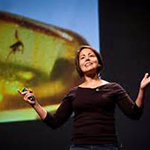In the summer of 1996, the world was shocked to discover that scientists had cloned a sheep. Less than two decades later, even more shocking cloning is possible. No longer the stuff of science fiction, cloning an extinct animal, such as a mammoth, is now possible thanks to new science called ancient DNA.

At the forefront of ancient DNA research is evolutionary biologist and MacArthur Fellow Beth A. Shapiro, DPhil, who will deliver the annual Ferguson Science Lecture at 5 p.m. Tuesday, March 31, in Knight/Bauer Hall’s Emerson Auditorium. The program, free and open to the public, is co-sponsored by the Woman’s Club of Washington University.
Shapiro is the author of “How to Clone a Mammoth: The Science of De-Extinction” (2015). As in her book, Shapiro’s talk will reveal the science behind the process of de-extinction, or bringing extinct species back to life. In addition to explaining the science, she will discuss de-extinction’s practical benefits and ethical challenges. Would de-extinction change the way we live? Is this cloning? What are the costs and risks? And what is the ultimate goal?
For Shapiro, one important goal is to inform future conservation practices. Her research involves tracking extinct species throughout their time on Earth and aligning it with concurrent environmental changes, allowing for unprecedented understanding of when a species’ genetic diversity changed and what changed it.
Her book has been endorsed by a number of prominent scientists, including Peter Raven, PhD, president emeritus of the Missouri Botanical Garden and the George Engelmann Professor of Botany Emeriti in Arts & Sciences.
“‘How to Clone a Mammoth’ takes a careful and entertaining look at the possibilities and consequences of bringing such animals as the mammoth and passenger pigeon back from extinction,” Raven said. “Well-written and informative, the book explores the science and people involved in these investigations and the difficulties and false leads that have been encountered.”
Shapiro is associate professor in the Department of Ecology and Evolutionary Biology at the University of California, Santa Cruz. She earned undergraduate and master’s degrees in ecology from the University of Georgia, and a doctorate in zoology from the University of Oxford where she studied as a Rhodes Scholar.
A book signing will follow Shapiro’s lecture. For more information on this or other Assembly Series programs, visit the assembly series website or call 314-935-4620.